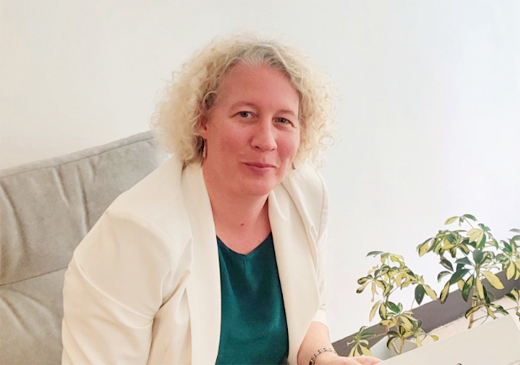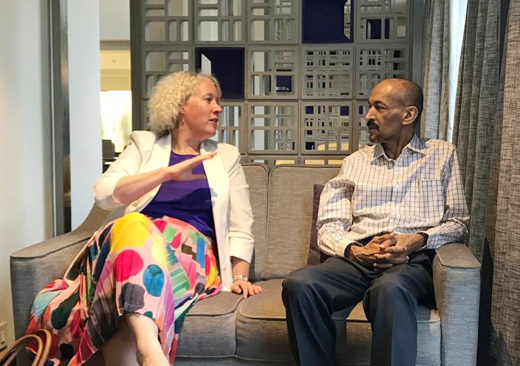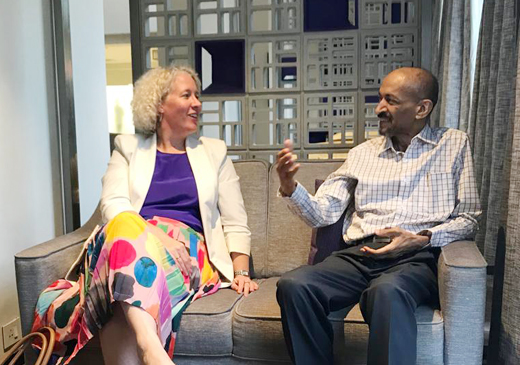
“The Indian diaspora is the second largest and fast growing community in Australia”: Australia’s first Consul General
Mangalore Today News Network
Mangaluru, June 17, 2024: Ms Hilary McGeachy is Australia’s first Consul General to Karnataka and Telangana, based in Bengaluru. A career officer with the Department of Foreign Affairs and Trade Ms McGeachy was most recently Director, CPTPP Section. She has previously served overseas in India and Germany. Ms McGeachy holds a Bachelor of Arts/Law from The Australian National University and a Master of International Affairs from King’s College London.

The new Consulate-General in Bengaluru is Australia’s fifth diplomatic mission in India, alongside New Delhi, Chennai, Kolkata and Mumbai. The decision to open a Consulate-General in Bengaluru reflects the depth and expansion in Australia-India ties.
The Consulate-General in Bengaluru will focus on deepening Australia’s ties to India’s vibrant innovation and technology ecosystem, as well as significant biotech, aerospace and defence industries, India’s national space agency, and leading education and research institutions in the states of Karnataka and Telangana.
Ms Hilary McGeachy was recently in Mangalore along with Vice Consul Ms Harriet White and MANGALORE TODAY caught up with her in the midst of her busy schedule for a brief chat on what brings her to our city and her first impression of coastal Karnataka.
Excerpts from the conversation:
What brings you to Mangalore and what are your first impressions of the city?
My brief as Consul General of Australia for Karnataka and Telangana is to engage with not just the main metros but also the Tier-2 cities of the two states. Mangalore is an important Tier-2 city and I have come here to establish valuable ties with industry, educational institutions and important administrative centers. I have had meetings with the Lok Sabha Member for Dakshina Kannada (Member of Parliament), Karnataka Chamber of Commerce and Industry, the Manipal Group and civil servants. Of course, I can’t complete all meetings in one visit, so I’ll be back for more.
I have had a very good impression of Mangalore so far. It’s a green, coastal city and vibrant with traditional as well as new-age industries. The education sector is very exciting. The people are warm and friendly and I look forward to building on the ties that I have made during this visit.
How is the relationship between India and Australia developing in the new century? What are the areas of co-operation that you foresee going forward?
As you may know, we have a very big community of Indians in Australia: almost a million people, which is 4% of the population. Australians of Indian origin contribute immensely to the economy and to our vibrant culture. Australia is a multi-cultural society and Indians have enriched different strands of that culture in food, music, arts, education as well as business. The continued implementation of the Australia-India Economic Cooperation and Trade Agreement (AI-ECTA) provides new opportunities for business and consumers in both countries. India has made important progress in science and technology especially in space, biotech and IT. Australia can benefit a great deal from this. At the same time Australian industry and universities have advanced knowledge to share with India. We also continue to be a major supplier of base raw materials to India. India has grown to become Australia’s sixth largest trading partner with mutual trade valued at $48 billion (AUD) in 2022.

Mangalore is starved for good inputs in the Tourism sector. How can Australia help?
Australia has a very successful tourism industry, including sporting activities like surfing and adventure tourism. I learnt on this visit that Mangaluru is a destination for cruise ships. I am sure there are Australians visiting southern India in this way, and I hope it will increase. Mangaluru is a beautiful location.
What collaboration can there be between India and Australia in the education sector?
Education is a key area where India and Australia can offer benefits to each other. The quality of education in Australian universities is very high and Indian students can make use of this to acquire valuable skills as well as to get long-term permits to work there as well. There are more than 120,000 students in Australian educational institutions as of this year. Karnataka too has educational institutions of high quality and we are trying to increase the number of educational collaborations and partnerships in this field. Australia’s Deakin University has already opened a teaching campus in India. We hope to see other Australian universities look at opportunities in Karnataka and other parts of India. The Manipal Group already has ties with 21 universities in Australia.
India considers Australia as a reliable supplier of critical raw materials especially in new-age industries such as solar energy and electric vehicles. What more can be done in this sector?
The Economic Cooperation and Trade Agreement (ECTA) between India and Australia means 96 per cent of Indian goods now enter Australia tariff-free, rising to 100 per cent by 2026. This is already having direct benefits for Indian exporters. Currently, 85 per cent of Australian goods enter India without tariffs. This will rise to 90 per cent over the next two years and will result in lower prices for Australian goods for Indian consumers.

Australia is the world’s largest lithium exporter and has the world’s largest nickel reserves and second largest reserves of cobalt, copper and vanadium. These are the critical minerals India needs to power its renewables manufacturing and exports. A Comprehensive Economic Cooperation Agreement (CECA) is currently under negotiation between India and Australia. CECA can improve supply chains for the critical minerals India will need to manufacture solar panels, wind turbines and electric vehicles.
What steps are being taken to improve connectivity between South India and Australia?
I am happy to say that a new Sydney-Bengaluru flight was launched recently and is proving to be a big success. We hope to see more direct routes in future from other locations in southern India. Such initiatives will immensely boost the business and cultural ties between South India and Australia. I am also happy to tell you that our tourist visa application process is an online application.
For cricket fans, it’s possible to fly direct to Sydney to see the Sydney Cricket Ground match of the 2024-25 Border-Gavaskar series!